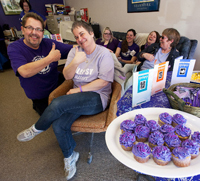Kerry Jenkins is living proof of the difference successful surgery can make in the life of a person who has epilepsy.
Since having deep brain stimulation (DBS) surgery in December 2012, Jenkins, who was once described by doctors as having one of the most severe cases of epilepsy in the world, has had her seizures reduced by half and her tonic-clonic seizures have disappeared.

For Jenkins, the journey with epilepsy has been on a road rife with challenges. Her marriage ended because of her condition, which also strained her relationship with one of her two children. She lost her driver’s licence because of her epilepsy, which presented transportation challenges for her, as she was living in Lindsay and having to travel more than 40 kilometres to her job in Peterborough every day.
With the challenges presented by her condition adding up, Jenkins says she saw little hope for the future. Clinical depression set in and became so severe that on two occasions she almost committed suicide.
But things would change for the better.
Now 45, Jenkins began having petit-mal seizures at seven, with up to 100 per day. Because these episodes only lasted two or three seconds and looked like quick pauses, her parents didn’t know they were seizures. It wasn’t until several years later she was examined by a physician for her seizures.
In August 2000, Jenkins had her first tonic-clonic seizure. The seizures progressed to an average of 15 per month. She was diagnosed as having both generalized seizures and temporal-lobe seizures.
In November 2010, she had an electroencephalogram (EEG) to examine her temporal lobe. Thirteen months later, upon recommendation from her neurologist, Dr. Richard Wennberg, Jenkins underwent deep brain stimulation (DBS) surgery. This operation involves implanting a “brain pacemaker” which sends electrical impulses to the brain.
Prior to the DBS surgery Jenkins was on several medications, but she was having allergic reactions and severe side effects — including glaucoma and asthma — to most medications.
The DBS surgery, says Jenkins, was the major game-changer in her life. Since the surgery, the number of seizures Jenkins experiences has declined from 15 to eight per month, with no more generalized seizures.
Jenkins credits Wennberg, neurosurgeon Dr. Taufik Valiante and her current neurologist, Dr. Danielle Andrade, for their tireless compassion and diligence which ensured she received the treatment she needed to change her life.
The fact that her seizure condition was so severe she almost ended her life because of it is the No. 1 reason Jenkins says she wants to share her story with the Voices of Epilepsy.
“Even if I can inspire one person to turn around and not (harm themselves),” she says. “It is not worth it; you can fight if you keep trying and you get the help you need.”
— More to come
Writer: Deron Hamel
If you have feedback on this story, or have a story of your own that you would like to share, please contact the newsroom at 800-294-0051, ext. 23, or e-mail deron(at)axiomnews.ca. You can also leave a comment below.





